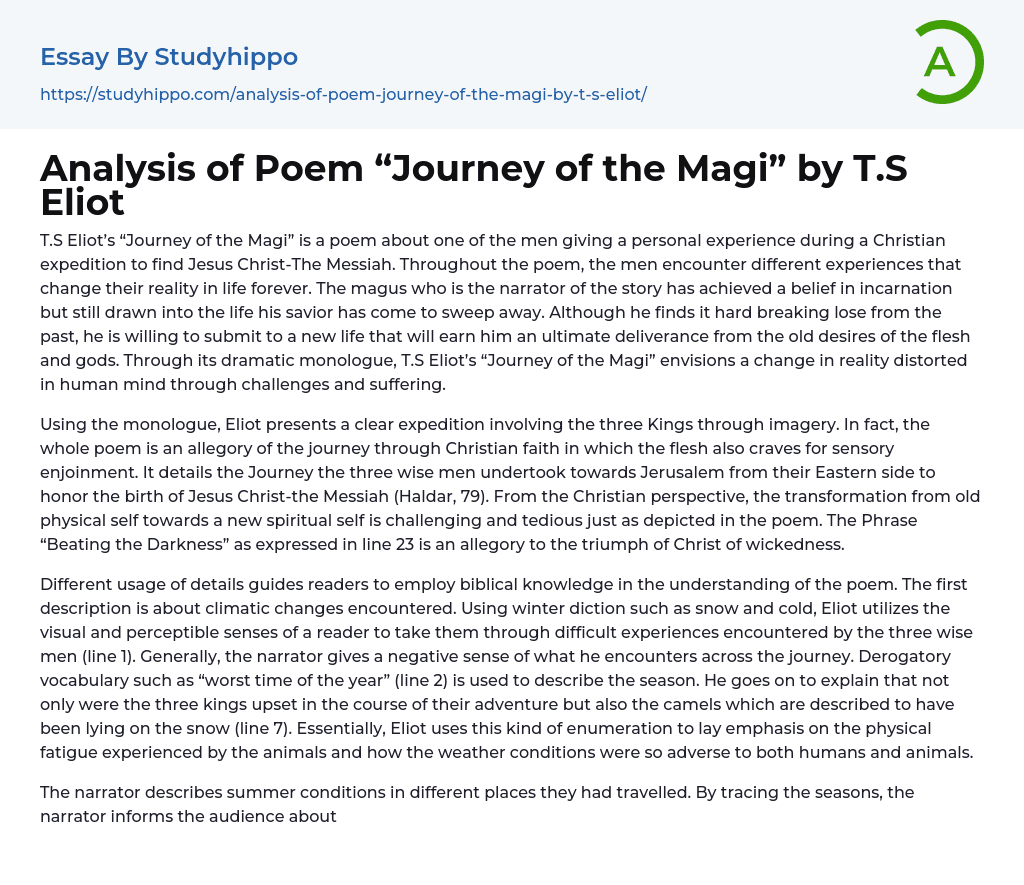

Analysis of Poem “Journey of the Magi” by T.S Eliot Essay Example
T.S Eliot’s “Journey of the Magi” is a poem about one of the men giving a personal experience during a Christian expedition to find Jesus Christ-The Messiah. Throughout the poem, the men encounter different experiences that change their reality in life forever. The magus who is the narrator of the story has achieved a belief in incarnation but still drawn into the life his savior has come to sweep away. Although he finds it hard breaking lose from the past, he is willing to submit to a new life that will earn him an ultimate deliverance from the old desires of the flesh and gods. Through its dramatic monologue, T.S Eliot’s “Journey of the Magi” envisions a change in reality distorted in human mind through challenges and suffering.
Using the monologue, Eliot presents a clear expedition involving the three Kings through i
...magery. In fact, the whole poem is an allegory of the journey through Christian faith in which the flesh also craves for sensory enjoinment. It details the Journey the three wise men undertook towards Jerusalem from their Eastern side to honor the birth of Jesus Christ-the Messiah (Haldar, 79). From the Christian perspective, the transformation from old physical self towards a new spiritual self is challenging and tedious just as depicted in the poem. The Phrase “Beating the Darkness” as expressed in line 23 is an allegory to the triumph of Christ of wickedness.
Different usage of details guides readers to employ biblical knowledge in the understanding of the poem. The first description is about climatic changes encountered. Using winter diction such as snow and cold, Eliot utilizes the visual and perceptible senses of a reader
to take them through difficult experiences encountered by the three wise men (line 1). Generally, the narrator gives a negative sense of what he encounters across the journey. Derogatory vocabulary such as “worst time of the year” (line 2) is used to describe the season. He goes on to explain that not only were the three kings upset in the course of their adventure but also the camels which are described to have been lying on the snow (line 7). Essentially, Eliot uses this kind of enumeration to lay emphasis on the physical fatigue experienced by the animals and how the weather conditions were so adverse to both humans and animals.
The narrator describes summer conditions in different places they had travelled. By tracing the seasons, the narrator informs the audience about the extent of his tedious expedition. Eliot skillfully transitions from the winter setting to the summer setting using a variety of word structure. For instance, the narrator mentions that their times when they had to regret (line 8). This exemplifies the narrator’s envision of their experience. So evident is the fact that the trip had many unexpected challenges that most of the time the Kings were tempted to give up on their mission in searching for the Messiah. Using the s alliteration, Eliot highlights the delicate elements in his descriptions such as “Palaces on Slopes, The Terraces” (line 9). The statement is sharply opposed to the cursing and grumbling camel man. Using the conjunction “and”, Eliot manages to add rhythm to his stanza in order to create a new contrast.
When the Three Kings have come closer towards fulfilling their objective, Eliot alludes to most
of biblical instances. One such biblical allusion is on betrayal of Jesus Christ by Judas. He states “Six hands dicing for silver” (line 27). Another one is based on the crucifixion of Jesus Christ where he mentions “three trees in the sky” (line 24). After their long journey full of encounters and challenges, the Three Kings come to the realization that a newborn baby is their savior. This scenario depicted how reality was so deceiving. Although disappointed by the realization, Magi is not disappointed by the challenges he had undergone. Perplexed by the essence of his mission, the narrator wonders whether they were “led all that way for birth or death” (line 36). He is confused of the similarity that exists between life and death.
The tone of the narrator is seen to have changed after the completion of his mission. He states that they returned to their “kingdoms” (line 40). This creates an impression that the Kings had changed their reality courtesy of their experience. Magi uses a mocking expression “Clutching Their gods” (line 42) to highlight his disappointment for having shared his experience. In essence, his experience actually changed his life.
In conclusion, the three Kings In “Journey of Magi” come in terms with a deceiving situation. They have to undergo a tedious and challenging expedition to meet a new born baby as their messiah. Even when they return to their native kingdoms, they can hardly recognize their own people. The monologue therefore is an illustration of a magus’ envision of the experience he undergoes through a challenging expedition and the impact of seeing his savior.
References
- Poetry By Heart | The Journey of the Magi.
(2016). Poetrybyheart.org.uk. Retrieved 14 July 2016, from http://www.poetrybyheart.org.uk/poems/the-journey-of-the-magi/
- American Literature essays
- Between The World and Me essays
- Book Report essays
- Book Review essays
- Book Summary essays
- Books essays
- Character essays
- Coming of Age essays
- Dante's Inferno essays
- Everyday Use essays
- Flowers for Algernon essays
- Genre essays
- Greek Mythology essays
- Incidents in The Life of a Slave Girl essays
- Letter essays
- Literary Criticism essays
- Literary devices essays
- Literature Review essays
- Metaphor essays
- Myth essays
- Play essays
- Plot essays
- Poem essays
- Poetry Analysis essays
- Protagonist essays
- Reader essays
- Reason essays
- Rhetoric essays
- Rhetorical Question essays
- Rhyme essays
- Simile essays
- Tragic Hero essays
- Translation essays
- Understanding essays
- Utopia essays
- Villain essays
- Writer essays



